First Sunday of Lent
February 18, 2018 Cycle B
Purple priestly vestments symbolize penance and preparation.
Introductory Acts of Worship
Home Page
Liturgical
Year Cycle B 2017-2018
The Entrance Prayers:
On Sunday, usually a hymn praising God
is sung in place of reciting a Psalm from the Bible which invites us to
enter more deeply into the mystery of God's love for us. The recited
weekday Psalm expresses a youthful heart and spirit, delighted that we may come
before the living God.
Entrance Song
/ Entrance Psalm (Antiphon)
Entrance Song
Psalm 91:15-16 When he calls
on me, I will answer him; I will deliver him and give him glory, I will grant
him length of days.
The Priest Approaches and Kisses the Altar:
The
altar is a symbol of Christ. In it are cut five crosses to recall the five
wounds of Christ. The altar also represents the Church and has embedded in
it the relics of her saints. The priest comes to the altar to celebrate
the Sacrifice in the Church's name. Because of the glory surrounding the
altar upon which the divine Sacrifice will be made, the kiss of the priest
unites the Church to Christ, its Redeemer.
Priest:
In the name of the Father, and of the Son, and of the Holy Spirit.
All:
Amen.
Priest: The Lord be with you.
All: And with your spirit.
The Penitential Prayers:
We recognize our guilt for past sins,
express our sorrow for them, and ask that Mary, the angels, the saints, and our
brothers and sisters in Christ pray for the Lord God's mercy. (The priest
may select from several forms).
Priest: Brothers and sisters, let
us acknowledge our sins, and so prepare ourselves to celebrate the sacred
mysteries.
Priest: You were sent to heal the contrite of heart: Lord,
have mercy.
All: Lord, have mercy.
Priest: You came to call sinners: Christ, have mercy.
All: Christ, have mercy.
Priest: You are seated at the right hand of the Father to intercede
for us: Lord, have mercy.
All: Lord, have mercy.
The Absolution:
Priest: May almighty God have
mercy on us, forgive us our sins, and bring us to everlasting life.
All:
Amen.
The Collect:
The
priest lifts the united prayers and petitions of the congregation to God the
Father through the merits of Jesus Christ in the Holy Spirit.
Priest: Let us pray.
Priest: Grant, almighty God, through the yearly observances
of holy Lent, that we may grow in understanding of the riches hidden in Christ
and by worthy conduct pursue their effects. Through our Lord Jesus Christ,
your Son, who lives and reigns with you in the unity of the Holy Spirit, one God
for ever and ever.
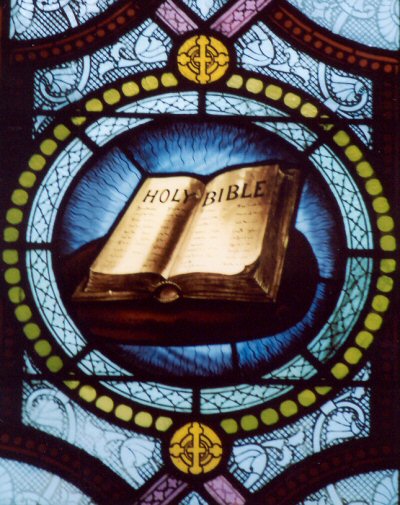 Liturgy
of the Word
Liturgy
of the Word
Christ is made known to us through the
Old Testament which prepares us to recognize Him. In those days, God
inspired men who spoke His message. Now, the New Testament Gospel reading
announces His presence to us directly through His Son. Both
readings bring God's message to us. Our responsibility is to respond.
The First Reading:
From the Old Testament Book of Genesis.
Genesis 9:8-15
God said to Noah and to
his sons with him: “See, I am now establishing my covenant with you and your
descendants after you and with every living creature that was with you: all the
birds, and the various tame and wild animals that were with you and came out of
the ark. I will establish my covenant with you, that never again shall all
bodily creatures be destroyed by the waters of a flood; there shall not be
another flood to devastate the earth.” God added: “This is the sign that I am
giving for all ages to come, of the covenant between me and you and every living
creature with you: I set my bow in the clouds to serve as a sign of the covenant
between me and the earth. When I bring clouds over the earth, and the bow
appears in the clouds, I will recall the covenant I have made between me and you
and all living beings, so that the waters shall never again become a flood to
destroy all mortal beings.”
Priest/Reader:
The Word of the
Lord.
All:
Thanks
be to God.
The Responsorial Psalm:
This Psalm praising God, is a prayer to God,
or recommends the practice of virtue. It is sung as an interlude between
the scriptural readings. It provides yet another instructional setting and
invites the assembly to imitate the cantor who sings a repeated response to the
verses of an ancient Psalm many of which are attributed to King David. The
verses are sung first by a cantor (song leader) accompanied by instruments, the
refrain is sung by the people.
Responsorial
Psalm 25:4-5, 6-7, 8-9
Cantor: Your ways, O Lord, are
love and truth to those who keep your covenant.
All: R/. Your
ways, O Lord, are love and truth to those who keep your covenant.
Cantor: Your ways, O Lord, make known to me; teach me your
paths. Guide me in your truth and teach me, for you are God my savior.
All: R/. Your
ways, O Lord, are love and truth to those who keep your covenant.
Cantor: Remember that your compassion, O Lord, and your love
are from of old. In your kindness remember me, because of your goodness, O
Lord.
All: R/. Your
ways, O Lord, are love and truth to those who keep your covenant.
Cantor: Good and upright is the Lord, thus he shows sinners
the way. He guides the humble to justice, and he teaches the humble his way.
All: R/. Your
ways, O Lord, are love and truth to those who keep your covenant.
The Second Reading:
Taken from the New Testament, often
from a letter written by St. Peter.
1 Peter 3:18-22
Beloved: Christ suffered
for sins once, the righteous for the sake of the unrighteous, that he might lead
you to God. Put to death in the flesh, he was brought to life in the Spirit.
In it he also went to preach to the spirits in prison, who had once been
disobedient while God patiently waited in the days of Noah during the building
of the ark, in which a few persons, eight in all, were saved through water.
This prefigured baptism, which saves you now. It is not a removal of dirt from
the body but an appeal to God for a clear conscience, through the resurrection
of Jesus Christ, who has gone into heaven and is at the right hand of God, with
angels, authorities, and powers subject to him.
Priest/Reader: The word
of the Lord.
All: Thanks be to God.
The Alleluia:
An ancient expression of joy anticipating
the Lord's message we will hear in the Gospel.
John 4:42, 15
Cantor: Praise to you, Lord Jesus Christ, King of endless
glory!
ALL: R/. Praise to you, Lord Jesus Christ, King of endless
glory!
Cantor: One does not live on bread alone, but on every
word that comes forth from the mouth of God.
ALL: R/. Praise to you, Lord Jesus Christ, King of endless
glory!
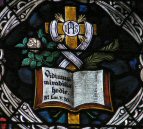 The Gospel:
The Liturgy of the Word is completed
by the reading of the Gospel. Before its reading, the members of the
assembly trace the sign of the cross upon the forehead to indicate their mental
acceptance of the Truth, on the lips to indicate their readiness to announce it,
and over the heart to indicate their sincere desire to accept it into their
lives. The "Good News" of the Gospel tells that God's kingdom has come for
all to hear, accept, and announce to the world for its salvation. It
is God who is speaking to us. Christ comes to teach us by the example of
His life and by His own words.
The Gospel:
The Liturgy of the Word is completed
by the reading of the Gospel. Before its reading, the members of the
assembly trace the sign of the cross upon the forehead to indicate their mental
acceptance of the Truth, on the lips to indicate their readiness to announce it,
and over the heart to indicate their sincere desire to accept it into their
lives. The "Good News" of the Gospel tells that God's kingdom has come for
all to hear, accept, and announce to the world for its salvation. It
is God who is speaking to us. Christ comes to teach us by the example of
His life and by His own words.
The Gospel: Mark 1:12-15
Mark's writings explain Christ to the
Gentiles who had become Christian.
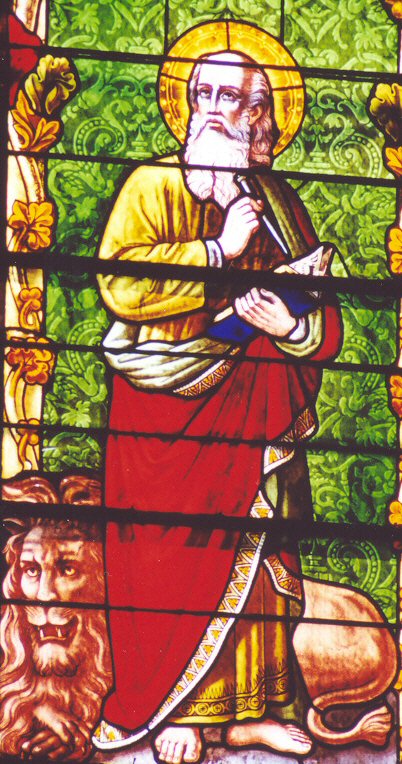 The Spirit drove Jesus out
into the desert, and he remained in the desert for forty days, tempted by
Satan. He was among wild beasts, and the angles ministered to him.
The Spirit drove Jesus out
into the desert, and he remained in the desert for forty days, tempted by
Satan. He was among wild beasts, and the angles ministered to him.
After John had been arrested, Jesus came to Galilee proclaiming the gospel
of God: “This is the time of fulfillment. The kingdom of God is at hand.
Repent, and believe in the gospel.”
Priest: The
Gospel of the Lord.
All: Praise to you, Lord Jesus Christ.
Priest: Through the words of the Gospel may our sins be wiped
away.
The Priest's Sermon:
The priest develops, explains, and comments upon the Master's words,
so our minds may be
enlightened, and our
hearts enriched.
(A priestly reflection upon this Gospel)
Profession of Faith:
We state in the
Nicene Creed the principles of our faith in precise and definite terms.
All: I believe in one God, the Father, the Almighty,
maker of heaven and earth, of all that is seen and unseen. I believe in
one Lord, Jesus Christ, the Only Begotten Son of God, born of the Father before
all ages.
God from God, Light from Light, true God from true God, begotten, not made,
consubstantial with the Father; through him all things were made. For us
men and for our salvation he came down from heaven, and by the Holy
Spirit was incarnate of the Virgin Mary, and became man. For our sake he was
crucified under Pontius Pilate, he suffered death and was buried, and rose again
on the third day in accordance with the Scriptures. He ascended into
heaven and is seated at the right hand of the Father. He will come again
in glory to judge the living and the dead and his kingdom will have no end.
I believe in the Holy Spirit, the Lord, the giver of life, who proceeds from
the Father and the Son, who with the Father and the Son is adored and
glorified, who has spoken through the prophets. I believe in one,
holy, catholic and apostolic Church. I confess one Baptism for the
forgiveness of sins and I look for the resurrection of the dead and the
life of the world to come. Amen.
General Intercessions:
We pray for the needs of the pope, civic
leaders, our own needs, those of others,
the sick, the dying, those who have died, the church, and the world.
The response of all to each intercession: Lord, hear our prayer.
All: Lord,
hear our prayer.
The Liturgy of the Eucharist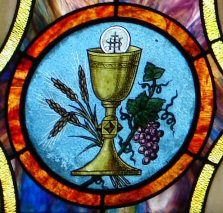
Gifts of bread and wine
symbolizing ourselves are presented to the priest who will offer them to God the
Father. Through the Holy Spirit, they will become the Body and Blood of
Jesus Christ whom we receive in Holy Communion. Jesus unites Himself with
us for our spiritual nourishment and strength. Today, when individuals do
not present their own personal offerings of bread and wine, the monetary contribution
symbolizes the material of their united sacrifice. The priest makes and
offering of the bread and wine to God.
Preparation of the Bread and
Wine:
Priest: Blessed are you, Lord God of all creation,
for through your goodness we have received the bread we offer you:
fruit of the earth and work of human hands, it will become for us the bread of
life.
All:
Blessed be God for ever.
Priest: By
the mystery of this water and wine may we come to share in the divinity of
Christ, who humbled himself to share
in our humanity.
Priest: Blessed are you, Lord God of all creation, for through your goodness we have
received the wine we offer you; fruit of the vine and work of human hands it will become our spiritual drink.
All: Blessed be God for ever.
Priest: With
humble spirit and contrite heart may we be accepted by you, O Lord, and may our
sacrifice in your sight this
day be pleasing to you, Lord God.
The Priest's Hands are Washed: This
act was traditionally necessary because the priest handled the various gifts
presented by the people. Now, the cleansing act using water reminds the
priest and ourselves of the need to cleanse not only the hands but the soul.
Soon, the priest's hands will hold the actual body of Christ, and we will become
His dwelling place.
Priest: Wash
me O Lord, from my iniquity and cleanse me from my sin.
Pray, brethren, that
my sacrifice and yours may be acceptable to God, the almighty Father.
All: May the Lord accept the sacrifice at your hands for the praise and glory of his
name, for our good and the good of all his holy Church.
Prayer over the Gifts:
Speaking in our name, the priest asks
the Father to accept the gifts we offer through him.
Priest: Give
us the right dispositions, O Lord, we pray, to make these offerings, for with
them we celebrate the beginning of this venerable and sacred time. Through
Christ our Lord.
Eucharistic Prayer:
(Number One: The priest may select from several forms).
Priest: The Lord be with you.
All: And with your
spirit.
Priest: Lift up your hearts.
All: We lift them up to the Lord.
Priest: Let us give thanks to the Lord, our God.
All: It is right
and just.
Preface Prayer:
Priest: It is truly right and just, our duty and our
salvation, always and everywhere to give you thanks, Lord, holy Father, almighty
and eternal God, through Christ our Lord. By abstaining forty long days
from earthly food, he consecrated through his fast the pattern of our Lenten
observance, and, by overturning all the snares of the ancient serpent, taught us
to cast out the leaven of malice, so that, celebrating worthily the Paschal
Mystery, we might pass over at last to the eternal paschal feast. And so,
with the company of Angels and Saints, we sing the hymn of your praise, as
without end we acclaim:
Acclamation:
Priest
and All:
Holy, Holy, Holy Lord, God of power and
might, Heaven and earth are full of your glory. Hosanna in the highest.
Blessed is he who comes in the name of the Lord. Hosanna in the highest.
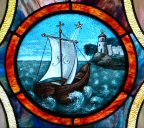 Priest: To
you, therefore, most merciful Father, we make humble prayer and petition through
Jesus Christ, your Son, our Lord: that you accept and bless these gifts, these
offerings, these holy and unblemished sacrifices, which we offer you firstly for
your holy catholic church. Be pleased to grant her peace, to guard, unite
and govern her throughout the whole world, together with your servant ______,
our Pope and _____, our Bishop, and all those who, holding to the truth, hand on
the catholic and apostolic faith.
Priest: To
you, therefore, most merciful Father, we make humble prayer and petition through
Jesus Christ, your Son, our Lord: that you accept and bless these gifts, these
offerings, these holy and unblemished sacrifices, which we offer you firstly for
your holy catholic church. Be pleased to grant her peace, to guard, unite
and govern her throughout the whole world, together with your servant ______,
our Pope and _____, our Bishop, and all those who, holding to the truth, hand on
the catholic and apostolic faith.
Remember, Lord, your servants _____ and _____
and all gathered here, whose faith and devotion are known to you. For
them, we offer you this sacrifice of praise or they offer it for themselves and
all who are dear to them: for the redemption of their souls, in hope of health
and well-being, and paying their homage to you, the eternal God, living and
true.
In communion with those whose memory we
venerate, especially the glorious ever-Virgin Mary, Mother of our God and Lord,
Jesus Christ, and blessed Joseph, her Spouse, your blessed Apostles and Martyrs,
Peter and Paul, Andrew, James, John, Thomas, James, Philip, Bartholomew,
Matthew, Simon and Jude; Linus, Cletus, Clement, Sixtus, Cornelius, Cyprian,
Lawrence, Chrysogonus, John and Paul, Cosmas and Damian and all your Saints; we
ask that through their merits and prayers, in all things we may be defended by
your protecting help. Through Christ our Lord. Amen.
The priest repeats the words which
Christ used at his Last Supper when He changed the bread into His Body and the
wine into His Blood. His Body and Blood are truly present but under the
appearance of bread and wine. The death of Christ is prolonged in each of
those who receive Him worthily. We apply His death to ourselves so that we
may share His glory. This moment is the most solemn on earth because it is
Divine act which enables us to apply to ourselves the Cross which Christ
willingly took upon Himself.
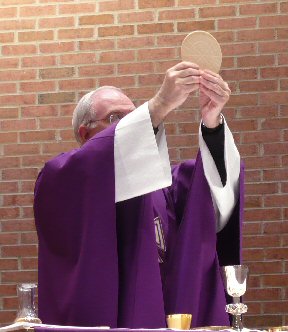 We are called to die to sin and
lift our very selves to God so that we become changed; to do as God would have
us do, to become what God would have us become. Our own little cross can
lift us into union with Christ's Cross so we may earn the joys of everlasting
happiness with God the Father.
We are called to die to sin and
lift our very selves to God so that we become changed; to do as God would have
us do, to become what God would have us become. Our own little cross can
lift us into union with Christ's Cross so we may earn the joys of everlasting
happiness with God the Father.
The
Lord's Supper:
On the day before he was to suffer, he took
bread in his holy and venerable hands, and with eyes raised to heaven to you, O
God, his almighty Father, giving you thanks, he said the blessing, broke the
bread and gave it to his disciples, saying:
Take this, all of you, and eat of it, for this is my Body, which will be given
up for you.
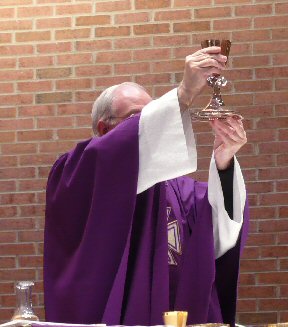 In a similar
way, when
supper was ended, he took this precious chalice in his holy and venerable hands,
and once more giving you thanks, he said the blessing and gave the chalice to
his disciples, saying:
In a similar
way, when
supper was ended, he took this precious chalice in his holy and venerable hands,
and once more giving you thanks, he said the blessing and gave the chalice to
his disciples, saying:
Take this, all of you, and drink from it; for this is the chalice of my
Blood, the Blood of the new and eternal covenant, which will be poured out for you and for many for the
forgiveness of sins. Do this in memory of me.
The Mystery of Faith:
Priest: Let us proclaim the mystery of faith:
Priest
and All: When we
eat this Bread and drink this Cup, we proclaim your Death, O Lord, until you
come again.
In
a similar way, when supper was ended, he took this precious chalice in his holy
and venerable hands, and once more giving you thanks, he said the blessing and
gave the chalice to his disciples, saying:
Take this, all of you, and
drink from it, for this is the chalice of my Blood, the Blood of the new and
eternal covenant, which will be poured out for you and for many for the
forgiveness of sins. Do this in memory of me.
Memorial Prayer: (The
priest may select from several forms).
 Priest:
Priest:
Recalls Christ's Passion, Resurrection, Ascension, the Church,
the dead, and ourselves.
Therefore, O Lord, as we celebrate the memorial of the blessed Passion, the
Resurrection from the dead, and the glorious Ascension into heaven of Christ,
your Son, our Lord, we, your servants and your holy people, offer to your
glorious majesty from the gifts that you have given us, this pure victim, this
holy victim, this spotless victim, the holy Bread of eternal life and the
Chalice of everlasting salvation.
Be pleased to look upon these offerings with
a serene and kindly countenance, and to accept them, as once you were pleased to
accept the gifts of your servant Able the just, the sacrifice of Abraham, our
father in faith, and the offering of your high priest Melchizedek, a holy
sacrifice, a spotless victim.
In humble prayer we ask you, almighty God:
command these these gifts be borne by the hands of your holy Angel to your altar
on high in the sight of your divine majesty, so that all of us, who through this
participation at the altar receive the most holy Body and Blood of your Son, may
be filled with every grace and heavenly blessing. Through Christ our Lord.
Amen.
Remember also, Lord, your servants _____ and
_____, who have gone before us with the sign of faith and rest in the sleep of
peace. Grant them, O Lord, we pray, and all who sleep in Christ, a place
of refreshment, light and peace. Through Christ our Lord. Amen.
To us, also, your servants, who, though sinners,
hope in your abundant mercies, graciously grant some share and fellowship with
your holy Apostles and martyrs: with John the Baptist, Stephen, Matthias,
Barnabas, (Ignatius, Alexander, Marcellinus, Peter, Felicity, Perpetua, Agatha,
Lucy, Agnes, Cecilia, Anastasia) and all your Saints; admit us, we beseech you,
into their company not weighing our merits, but granting us your pardon, through
Christ our Lord.
Through whom you continue to make all these good
things, O Lord; you sanctify them, fill them with life, bless them, and bestow
them upon us.
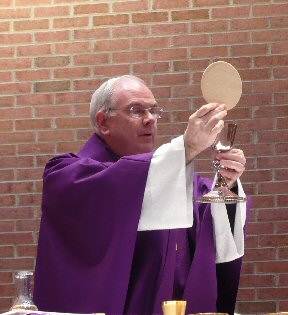 Doxology:
Doxology:
Prayer of Praise: Through him, with him,
and in him, in the unity of the Holy Spirit, all glory and honor is yours,
almighty Father, for ever and ever.
All: Amen.
Communion Rite
In the Liturgy of the Eucharist, we
symbolically offer ourselves to the Lord through the gifts of bread and wine.
At the Consecration, we offer our very lives to be united the God the Father
through the Cross of Christ. In Communion, we find that we have not died
at all, but have come to life. We have surrendered ourselves to God
through His Divine Son, Jesus Christ. In return become ennobled and
enriched. We give up time and we get eternity, we give up our sin and we
receive grace, we surrender our self-will and receive the strength of the Divine
Will, we give up ourselves and we receive everything. For the Son of God
says to us that unless we receive Him we shall not have Divine life in us.
But it is not really we who receive Christ as it is Christ who receives us,
bringing us into Himself.
God makes His Cross the very means
of our salvation and our life. While we have crucified Him, His eternal
love cannot be extinguished. Christ willed to give us the very life we
crucified in our Redemption, the Consecration of Holy Thursday into Communion,
His death into our everlasting life.
The Lord's
Prayer:
Priest:
At the Savior's command and formed by divine teaching, we dare to say:
Priest and
All: Our
Father, who art in heaven, hallowed be they name; Thy kingdom come; Thy will be
done on earth as it is in
heaven. Give us this
day our daily bread; and forgive us our trespasses as we forgive those who
trespass against us; and lead us not into temptation, but deliver us from evil.
Priest: Deliver us, Lord, we pray, from every evil,
graciously grant peace in our days, that, by the help of your mercy, we may be
always free from sin and safe from all distress, as we await the
blessed hope and the coming of our Savior, Jesus Christ.
All: For the kingdom, the power,
and the glory are yours, now and for ever.
Prayer for
Peace:
Priest: Lord
Jesus Christ, you said to your apostles: I leave you peace, my peace I give you.
Look not on our sins, but on the faith
of your Church, and graciously grant her peace and unity in accordance with your
will. Who live and reign for ever and ever.
All: Amen.
Priest: The
peace of the Lord be with you always.
All: And with your spirit.
Priest: Let us offer each other the sing of peace.
Breaking of the Bread:
Priest: May this mingling of the body and blood of our Lord
Jesus Christ bring eternal life to us who receive it.
Priest and All: Lamb of God, you take away the sins of the
world, have mercy on us.
Lamb of God, you take away the sins of the world, have mercy on us.
Lamb of God, you take away the sins of the world, grant us peace.
Communion of the Priest:
Priestly Preparation: Lord
Jesus Christ, Son of the living God, who, by the will of the Father and the work
of the Holy Spirit, through your Death gave life to the world, free me by this,
your most holy Body and Blood, from all my sins and from every evil; keep me
always faithful to your commandments, and never let me be parted from you.
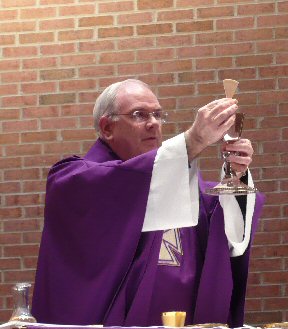 Priest: Behold the Lamb of God who takes away the sins of the world. Happy are
those who are called to his supper.
Priest: Behold the Lamb of God who takes away the sins of the world. Happy are
those who are called to his supper.
Priest and All: Lord,
I am not worthy to receive you, but only say the word and I shall be healed.
Priest: May the Body of Christ keep me safe for eternal life.
May the Blood of Christ keep me safe for eternal life.
Communion Antiphon:
Matthew 4:4
One does not
live by bread alone, but by every word that comes forth from the mouth of God.
Communion of the Faithful:
Priest:
The Body of Christ.
The Faithful: Amen.
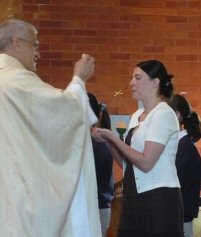
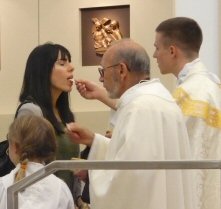
Priest/Deacon/
Extraordinary Eucharistic Minister:
The Blood of Christ.
The Faithful: Amen.
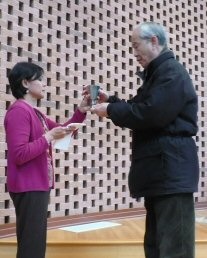
Cleansing of the Vessels:
Priest: Lord,
may I receive these gifts in purity of heart. May they bring me healing
and strength, now and for ever.
Prayer after Communion:
Priest: Let us pray.
Priest: Renewed now with heavenly bread, by which faith is
nourished, hope increased, and charity strengthened, we pray, O Lord, that we
may learn to hunger for Christ, the true and living Bread, and strive to live by
every word which proceeds from your mouth. through Christ our Lord.
All: Amen.
Concluding Rite
Priest: The Lord be with you.
All: And
with your spirit.
Priest:
Bow your heads and pray for God's blessing.
Dismissal Prayer:
(The priest may select
from several forms)
Priest: May the bountiful blessing, O
Lord, we pray, come down upon your people, that hope may grow in tribulation,
virtue be strengthened in temptation, and eternal redemption be assured.
Through Christ our Lord.
Final Blessing:
Priest: And may the blessing of almighty God, the Father, and
the Son, and the Holy Spirit, come down on you and remain with you for ever.
All: Amen.
Dismissal:
Priest: Go forth, the Mass is ended.
All: Thanks be to God.
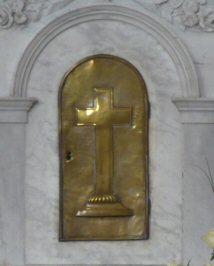 O my Jesus, forgive us our sins.
O my Jesus, forgive us our sins.
Save us from the fires of hell.
Lead all souls to heaven,
especially those in most need of your mercy.
www.Divinemasterplanforlife.com
www.Saintsnheaven.com
Top
Home Page
Liturgical
Year Cycle B 2017-2018
 Liturgy
of the Word
Liturgy
of the Word The Gospel:
The Liturgy of the Word is completed
by the reading of the Gospel. Before its reading, the members of the
assembly trace the sign of the cross upon the forehead to indicate their mental
acceptance of the Truth, on the lips to indicate their readiness to announce it,
and over the heart to indicate their sincere desire to accept it into their
lives. The "Good News" of the Gospel tells that God's kingdom has come for
all to hear, accept, and announce to the world for its salvation. It
is God who is speaking to us. Christ comes to teach us by the example of
His life and by His own words.
The Gospel:
The Liturgy of the Word is completed
by the reading of the Gospel. Before its reading, the members of the
assembly trace the sign of the cross upon the forehead to indicate their mental
acceptance of the Truth, on the lips to indicate their readiness to announce it,
and over the heart to indicate their sincere desire to accept it into their
lives. The "Good News" of the Gospel tells that God's kingdom has come for
all to hear, accept, and announce to the world for its salvation. It
is God who is speaking to us. Christ comes to teach us by the example of
His life and by His own words. The Spirit drove Jesus out
into the desert, and he remained in the desert for forty days, tempted by
Satan. He was among wild beasts, and the angles ministered to him.
The Spirit drove Jesus out
into the desert, and he remained in the desert for forty days, tempted by
Satan. He was among wild beasts, and the angles ministered to him.
 Priest: To
you, therefore, most merciful Father, we make humble prayer and petition through
Jesus Christ, your Son, our Lord: that you accept and bless these gifts, these
offerings, these holy and unblemished sacrifices, which we offer you firstly for
your holy catholic church. Be pleased to grant her peace, to guard, unite
and govern her throughout the whole world, together with your servant ______,
our Pope and _____, our Bishop, and all those who, holding to the truth, hand on
the catholic and apostolic faith.
Priest: To
you, therefore, most merciful Father, we make humble prayer and petition through
Jesus Christ, your Son, our Lord: that you accept and bless these gifts, these
offerings, these holy and unblemished sacrifices, which we offer you firstly for
your holy catholic church. Be pleased to grant her peace, to guard, unite
and govern her throughout the whole world, together with your servant ______,
our Pope and _____, our Bishop, and all those who, holding to the truth, hand on
the catholic and apostolic faith.
 We are called to die to sin and
lift our very selves to God so that we become changed; to do as God would have
us do, to become what God would have us become. Our own little cross can
lift us into union with Christ's Cross so we may earn the joys of everlasting
happiness with God the Father.
We are called to die to sin and
lift our very selves to God so that we become changed; to do as God would have
us do, to become what God would have us become. Our own little cross can
lift us into union with Christ's Cross so we may earn the joys of everlasting
happiness with God the Father.
 In a similar
way, when
supper was ended, he took this precious chalice in his holy and venerable hands,
and once more giving you thanks, he said the blessing and gave the chalice to
his disciples, saying:
In a similar
way, when
supper was ended, he took this precious chalice in his holy and venerable hands,
and once more giving you thanks, he said the blessing and gave the chalice to
his disciples, saying:  Priest:
Priest:  Doxology:
Doxology:  Priest: Behold the Lamb of God who takes away the sins of the world. Happy are
those who are called to his supper.
Priest: Behold the Lamb of God who takes away the sins of the world. Happy are
those who are called to his supper. 


 O my Jesus, forgive us our sins.
O my Jesus, forgive us our sins.